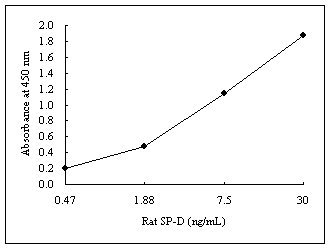Rat/Mouse SP-D Kit YAMASA EIA
Surfactant protein D (SP-D) is a glycoprotein (Mw = 43 kDa) with a collagen-like structure. SP-D belongs to the subgroup (colectin) of the C-type lectin, produced in alveolar type II epithelial cells. Human serum SP-D is high in patients with interstitial pneumonia, suggesting that it serves as a diagnostic marker for interstitial pneumonia. Yamasa Corporation developed and is manufacturing and distributing SP-D kit “Yamasa” EIA II, a human SP-D measurement kit, which has been widely employed for laboratory tests (marketing is contracted to Kyowa Medex Co., Ltd.).
In addition, Yamasa Corporation investigated the rat SP-D measurement system and developed rat SP-D measurement ELISA with a monoclonal anti-rat SP-D antibody1). This ELISA allows highly sensitive measurement of rat serum SP-D. In addition, the antibody used in the ELISA also reacts with mouse SP-D, allowing the measurement of mouse SP-D. Serum SP-D concentrations in rats and mice with bleomycin-induced pulmonary fibrosis were examined using the ELISA, demonstrating that serum SP-D levels were high in those with lung injuries2) (summarized in this reference). Rat/Mouse SP-D Kit YAMASA EIA was developed using the ELISA.
To elucidate the functions of SP-D in vivo, animal experiments are indispensable. This product that allows highly sensitive measurement of rat/mouse SP-D is useful to investigate SP-D. In addition, a study using rats and mice with bleomycin-induced lung fibrosis demonstrated that SP-D may serve as a serum marker to monitor lung injury, suggesting that our product may be useful for detecting lung injuries in various animal experiments.
- ELISA with a 96-well microtiter plate.
- Rat SP-D levels can be measured in a range of 0.47-30 ng/mL.
- Measurement time: primary reaction, 2 hours; secondary reaction, 1 hour: and color reaction, 20 minutes.
- Rat and mouse SP-D can be measured.*1
- SP-D in rat and mouse sera and bronchoalveolar lavage fluids can be measured.*2
*1: Mouse SP-D concentrations are equivalents of rat SP-D. For detailed information, see (1) of “Notes of measurement.”
*2: Dilution ratios vary with samples. For detailed information, see (2) of “Notes of measurement.”
Sandwich ELSIA with two types of mouse monoclonal anti-rat SP-D antibody
– Product code: 80072
– Components:
| Name | Volume | Quantity | |
| (1) | Antibody solid phase plate | 96-well microtiter plate | 1 plate |
| (2) | SP-D standard solution 1 (SP-D concentration: 0.47 ng/mL) | 0.5mL | 1 vial |
| (3) | SP-D standard solution 2 (SP-D concentration: 1.88 ng/mL) | 0.5mL | 1 vial |
| (4) | SP-D standard solution 3 (SP-D concentration: 7.5 ng/mL) | 0.5mL | 1 vial |
| (5) | SP-D standard solution 4 (SP-D concentration: 30 ng/mL) | 0.5mL | 1 vial |
| (6) | Diluent | 50mL | 1 vial |
| (7) | Washing stock | 50mL | 1 vial |
| (8) | Enzyme-labeled antibody | 0.15mL | 1 vial |
| (9) | Diluent for enzyme-labeled antibodies | 15mL | 1 vial |
| (10) | Coloring solution A | 0.5mL | 1 vial |
| (11) | Coloring solution B | 11mL | 1 vial |
| (12) | Stop solution | 11mL | 1 vial |
– Storage:2-8℃
– Shelf life: 24 months after the date of manufacture
– Suggested Retail Price:¥ 120,000
<Outline>
|
|
Example of a standard curve |
(1) Since the standard solution attached to the product is rat SP-D, the measured values of mouse samples are calculated as equivalents of rat SP-D.
(2) Dilute samples with the attached diluent before measurement (dilution rates: 50-fold for rat sera, 10-fold for mouse sera, and 100-fold for bronchoalveolar lavage fluids). Dilute samples appropriately when their concentrations are above the measurement range.
(3) For more information, contact Marketing & MR Section.
1. Murata M et al. (2010). Exp Lung Res. 36(8). 463-468.
2. Murata M. et al.: J Toxicol Sci. Vol. 35:Supplement P.S 208
3. Murata M et al. (2016). Exp Lung Res. 42(6). 314-321.


